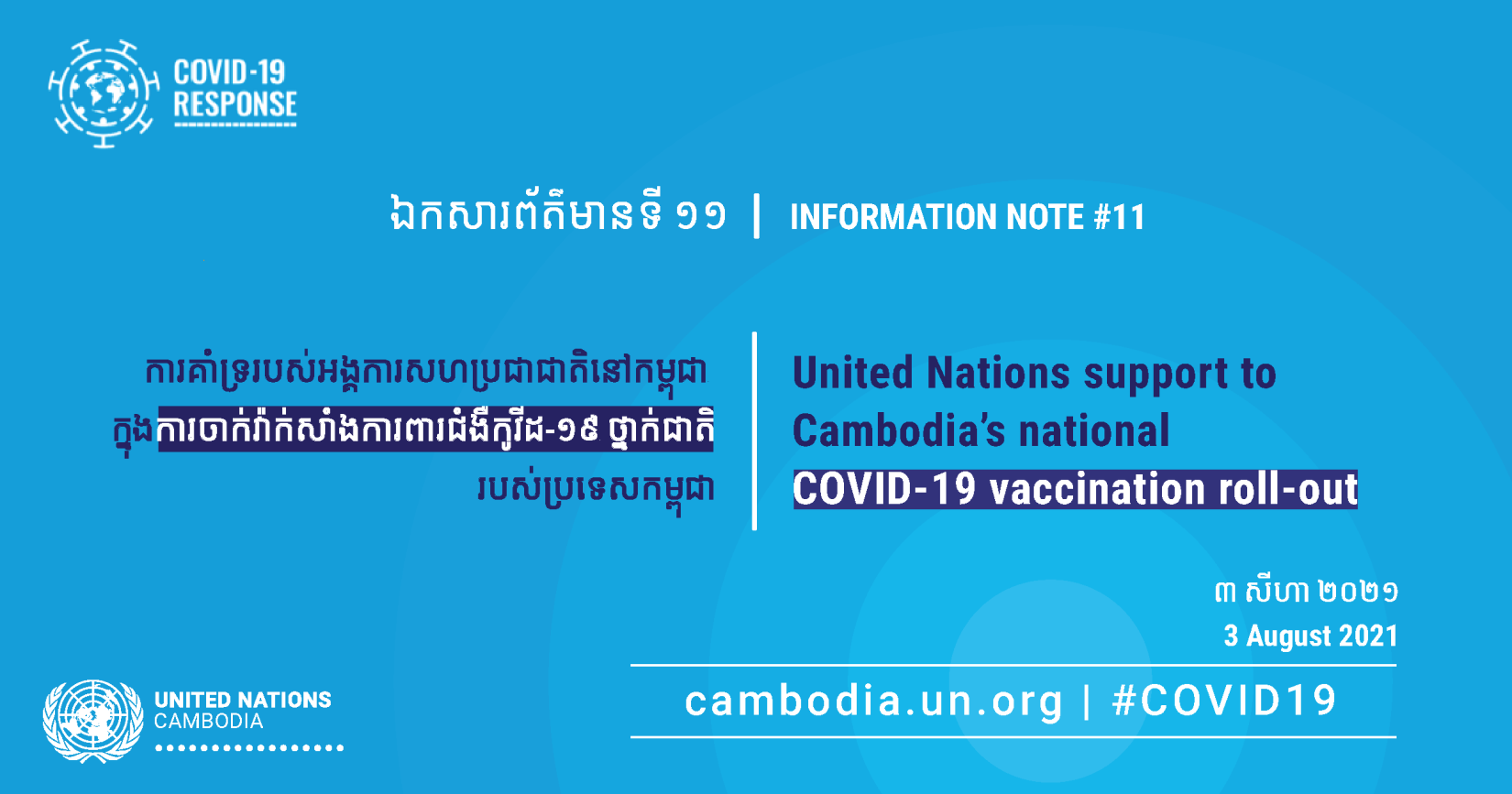Information Note #11: United Nations support to Cambodia’s national COVID-19 vaccination roll-out
03 August 2021

The Royal Government of Cambodia launched its national vaccination campaign against COVID-19 on 10 February 2021 with a target to vaccinate 10 million adults by the end of 2021. Priority groups for vaccination include frontline healthcare workers, the elderly, persons with co-morbidities and the wider adult population. As of 24 July 2021, a total of 6.6million[1] people received a first dose of a COVID-19 vaccine and 4.4 million[2] were vaccinated with a second dose. Among the targeted population, 50% of females received a first dose while 49% received a second dose. Vaccinations for elderly persons aged 60 and over continued to be prioritized and accelerated and as of mid-June 2021, 93% of health care workers were vaccinated with a second dose. Despite the constrained global supply of COVID-19 vaccines, the Royal Government has been able to secure, through bilateral procurement, COVAX and donations, a pipeline of COVID-19 vaccines to meet its target. To date a total of 17,356,000 million doses of COVID-19 vaccines have been received in Cambodia and more are expected in the coming months.
Cambodia has one of the highest percentages of COVID-19 vaccination among its adult population in the WHO Western Pacific Region and is among the top 17 countries in the world to first vaccinate teachers. Based on available data, vaccine hesitancy in Cambodia is relatively low compared to other countries in the world. Since the onset of large-scale community transmission of COVID-19 in February 2021, the vaccination strategy adopted a geographical based roll-out, which prioritized vaccination in areas and cities at high risk for transmission, while gradually rolling-out vaccination to the rest of the country. The Royal Government established several high-level committees, including the Ad-hoc Committee for COVID-19 Vaccination with five sub-committees and provincial committees to ensure efficient vaccinations country-wide; as well as to address the ongoing large-scale community transmission of COVID-19, including the imminent threat of the Delta variant. Currently, Cambodia uses COVID-19 vaccines Sinovac, Sinopharm and AstraZeneca/Covishield which have obtained WHO approvals[3], with upcoming plans to include the Janssen (Johnson&Johnson) vaccine to its country vaccine portfolio. Recommended doses of vaccine granted WHO Emergency Use Listing have been shown to provide excellent protection from severe disease and hospitalization against the Delta variant as well as against other variants of concern.
The United Nations has been assisting the Royal Government’s COVID-19 response and vaccination roll-out, as a top priority. Overall, the United Nations focuses on strengthening health systems as part of ‘building back better,’ promoting equitable vaccination and ensuring that those with highest risk for infection of COVID-19 are vaccinated first. In line with this, the United Nations provided technical support to the Royal Government for the development of the National Deployment and Vaccination Plan (NDVP) and the Operational Guidelines for COVID-19 for the vaccination campaign roll-out. Cambodia joined the COVAX Facility, a global mechanism managed by GAVI, CEPI and WHO which aims to ensure COVID-19 vaccines are affordable and available to all countries. The United Nations has been working to ensure Cambodia’s access to COVID-19 vaccines. Through its cross-sector programmes and strategic partnerships, the United Nations is supporting the Royal Government to reach the most vulnerable populations to ensure timely access to accurate information about COVID-19 vaccines and to quality and safe vaccination services. More specific assistance provided to the Royal Government by the United Nations, with funding from key donors, have included:
- Strategic and technical advice to the Ad hoc Committee, its sub-committees and the Ministry of Health for the vaccination campaign.
- Assessment of capacities and needs and update of relevant technical and operational guidelines.
- Procurement of cold chain equipment and supplies to ensure adequate storage and transport capacity of COVID-19 vaccines at all levels.
- Training of vaccination teams for safe and effective handling of COVID-19 vaccines and support for the surveillance and management of Adverse Effects Following Immunization (AEFIs).
- Sector coordination through the Health Partners Group (HPG) forum including coordination of development partner contributions and identification of emerging risks and priorities.
- Development of a Risk Communication and Community Engagement (RCCE) strategy, plan and communication tools to promote uptake of COVID-19 vaccination, including the establishment of social listening platforms.
- Development of the monitoring and evaluation (M&E) framework for COVID-19 vaccination, together with the Royal Government, including the development of data management and monitoring tools, evaluation protocols and technical inputs to the new e-system for COVID-19 registration, recording and reporting.
- Joint monitoring with the Royal Government of the COVID-19 vaccination campaign.
- Identification and facilitation of access to vaccines for specific adult vulnerable groups in coordination with local authorities and partners to ensure equitable and inclusive vaccination. Vulnerable groups have included the elderly, ID poor, ethnic minorities, people with disabilities, people in street situation and in institutional and residential care facilities.
Recently, the Government announced its plans to vaccinate children 12 to 17 years old starting in August 2021. Evidence and guiding policies on COVID-19 vaccination among children are still emerging. In line with current WHO guidance, the United Nations recommends that adults and those with higher risk to infection (including frontline health and social workers), elderly and the most vulnerable should continue to be prioritized for vaccination, especially given global vaccine supply constraints. Children with underlying medical risks to develop severe Covid-19 infection are recommended to be vaccinated after adults with underlying medical conditions have been reached. Vaccinating children and adolescents may be needed in the future to further limit virus transmission, reduce the risk of new variants emerging and protect vulnerable and unvaccinated groups. See also UN Info Note #10 on Education for more information on vaccinating children.
Vaccination is one of the key strategies in the fight against COVID-19. To effectively curb the transmission of COVID-19, vaccinations should be accompanied by effective public health and social measures. In this regard, the United Nations continues to encourage and support the authorities to implement measures such as strong surveillance, strategic testing, early case detection, isolation and clinical care as well as mask wearing, hand hygiene and physical distancing. The United Nations continues to advocate that the most at-risk populations be vaccinated first and for strengthening monitoring and evaluation systems to ensure the availability of disaggregated data and analysis to support efforts aimed at identifying high risk groups and ensuring equitable vaccination. The United Nations also urges continued community engagement and effective communications at national and local levels to reduce COVID-19 transmission, counter misinformation, and improve COVID-19 vaccine acceptance. Sustainable recovery from the pandemic requires bolstering the health care system and strengthening preparedness for potential future health emergencies. At the global level, the United Nations has called for global solidarity to tackle the virus and advocates for fair, equitable and safe access to vaccines for people in all countries. The United Nations in Cambodia remains committed to supporting the Royal Government in its COVID-19 response and vaccination roll out to protect people, save lives and ensure a more resilient recovery from the pandemic.
###
UN Cambodia’s Response to COVID-19 Information Notes are official documents from the United Nations in Cambodia intended for the media and other partners. They are prepared by the Office of the UN Resident Coordinator.
[1] 6,648,473 people or 66% of targeted adult population and 39% of total country population
[2] 4,431,252 people or 44% of targeted adult population and 29% of total country population
[3] They have received Emergency Use Listing (EUL) and Emergency Use Authorization (EUA)



